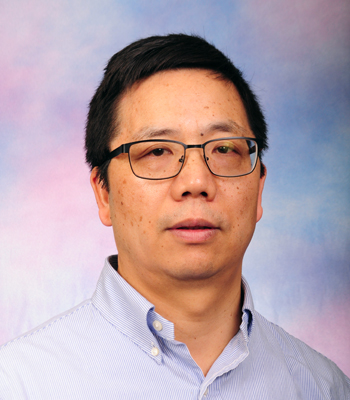Gen Wu
Position Title
Professor
Basic Science
Office Location
Karmanos Cancer Institute
Elliman Building - 1246
421 E. Canfield
Detroit, MI 48201
Mailing Address
Karmanos Cancer Center
4100 John R
Mail Code: EL01DD
Detroit, MI 48201
Office Phone
(313) 578-4750Education Training
Postgraduate Training
(1995-1999) Howard Hughes Medical Institute, University of Pennsylvania School of Medicine, Philadelphia, PA
(1993-1995) University of Pittsburgh School of Medicine, Pittsburgh, PA
(1992) Ph.D. Peking Union Medical College, Beijing, China
Professional Experience
Faculty Appointments
(2015-Present) Professor with Tenure, Department of Oncology and Department of Pathology, Wayne State University School of Medicine, Detroit, MI
(2004-Present) Graduate Faculty Member, Cancer Biology Program, Wayne State University, Detroit, MI
(2011-2015) Associate Professor with tenure, Department of Oncology, Wayne State University School of Medicine, Detroit, MI
(2005-2015) Associate Professor with tenure, Karmanos Cancer Institute and Department of Pathology, Wayne State University School of Medicine, Detroit, MI
(1999-2005) Assistant Professor, Karmanos Cancer Institute and Department of Pathology, Wayne State University School of Medicine, Detroit, MI
Hospital or Other Professional Appointments
(1999-Present) Member, Karmanos Cancer Institute
Major Professional Societies
(2005-Present) American Association for Cancer Research
Honors and Awards
(2007) Karmanos Cancer Center Director's Award, Karmanos Cancer Institute (For the aticle by Wang et al in Cancer Research 66:8870-8877, 2006).
Courses taught
CB 7210: Fundamentals of Cancer Biology
CB 7220: Molecular Biology of Cancer Development
CB 7240: Cancer Chemotherapy
CB 7460: Mechanisms of Neoplasia - Alterations to Cellular Signaling
Research Interests
My research interests are to understand the mechanisms of deregulated cell death pathways in human cancer and then target related pathways for the improvement of cancer therapies. Specifically, we focus on three areas. (1) We study the mechanisms of tumor necrosis factor (TNF)-related apoptosis-inducing ligand (TRAIL) resistance. TRAIL is a member of the TNF family that selectively induces apoptosis of cancer and transformed cells, but not normal cells. However, many cancer cells are resistant to TRAIL and the underlying mechanisms are not fully understood. We are currently studying how cancer cells acquire resistance to TRAIL. (2) We study the regulation of mitogen-activated protein kinase (MAPK) phosphatase-1 (MKP-1) in cancer cells. MKP-1 is a member of the dual-specificity protein phosphatase family and an endogenous negative regulator of MAPK signaling. MKP-1 can dephosphorylate and inactivate all three major MAPKs, including JNK, p38 and ERK. MKP-1 is overexpressed in many cancer types and may regulate cancer cell drug resistance. It is established that the activation of MAPKs plays a critical role in the response of cancer cells to therapies. We are studying how MKP-1 inactivates MAPKs to impact cancer cell death. (3) We study the contribution of autophagy to drug resistance. Ultimately, this information will help design therapeutic strategies for the improvement of cancer treatment.
Publications
1. Wang, J., Zhou, J.Y., and Wu, G.S. ERK-dependent MKP-1-mediated cisplatin resistance in human ovarian cancer cells. Cancer Res. 67:11933-41, 2007.
2. Wang, J., Zhou, J.Y, and Wu, G.S. Bim protein degradation contributes to cisplatin resistance. J Biol Chem. 286:22384-92, 2011.
3. Joshua E. Allen, J.E., Krigsfeld, G., Mayes, P.A., Patel, L., Dicker, D.T., Patel, A.S., Dolloff, N.G., Messaris, E., Scata, K.A., Wang, W., Zhou, J.Y., Wu, G.S., and El-Deiry, W.S. Dual inactivation of Akt and ERK by TIC10 signals Foxo3a nuclear translocation, TRAIL gene induction and potent anti-tumor effects. Science Translational Medicine. 5(171):171ra17, 2013.
4. Xu,, J., Xu, Z., Zhou, J.Y., Zhuang, Z., Wang, E., Boerner, J., and Wu, G.S. Regulation of the Src-PP2A interaction in tumor necrosis factor (TNF)-related apoptosis-inducing ligand (TRAIL)-induced apoptosis. J Biol Chem. 288:33263--71, 2013.
5. Wang, J., and Wu. G.S. Role of autophagy in cisplatin resistance in ovarian cancer. J Biol Chem. 289:17163-73, 2014.
6. Wang, J., Kho, D.H., Zhou, J.Y. Wu, G.S. MKP-1 suppresses PARP-1 degradation to mediate cisplatin resistance. Oncogene. 36(43):5939-47, 2017.
7. Wang. J., Zhou, J.Y., Kho, D., Reiners, J.J. Jr., Wu, G.S. Role for DUSP1 (dual-specificity protein phosphatase 1) in the regulation of autophagy. Autophagy. Oct2;12(10):1791-1803, 2016.
8. Kho, D.H., Uddin, M.H., Chatterjee, M., Vogt, A., Raz, A., and Wu, G.S. GP78 cooperates with dual-specificity phosphatase 1 to stimulate epidermal growh factor receptor-mediated extracellular signal-regulated signaling. Mol Cell Biol 39: pii: e00485-18, 2019.
9. Pimentel, J.M., Zhou, J.Y., Kim, S., Gurdziel, K., and Wu, G.S. The role of the immune response and inflammatory pathways in TNF-related apoptosis-inducing ligand (TRAIL) resistance in triple-negative breast cancer cells. Am J. Cancer Res. 2023 Oct 15;13(10):4678-4692.
10. Pimentel, J.M., Zhou, J.Y., and Wu, G.S. Regulation of programmed death ligand 1 (PD-L1) expression by TNF-related apoptosis-inducing ligand (TRAIL) in triple-negative breast cancer cells. Mol Carcinog. 2023 Feb;62(2):135-144.
